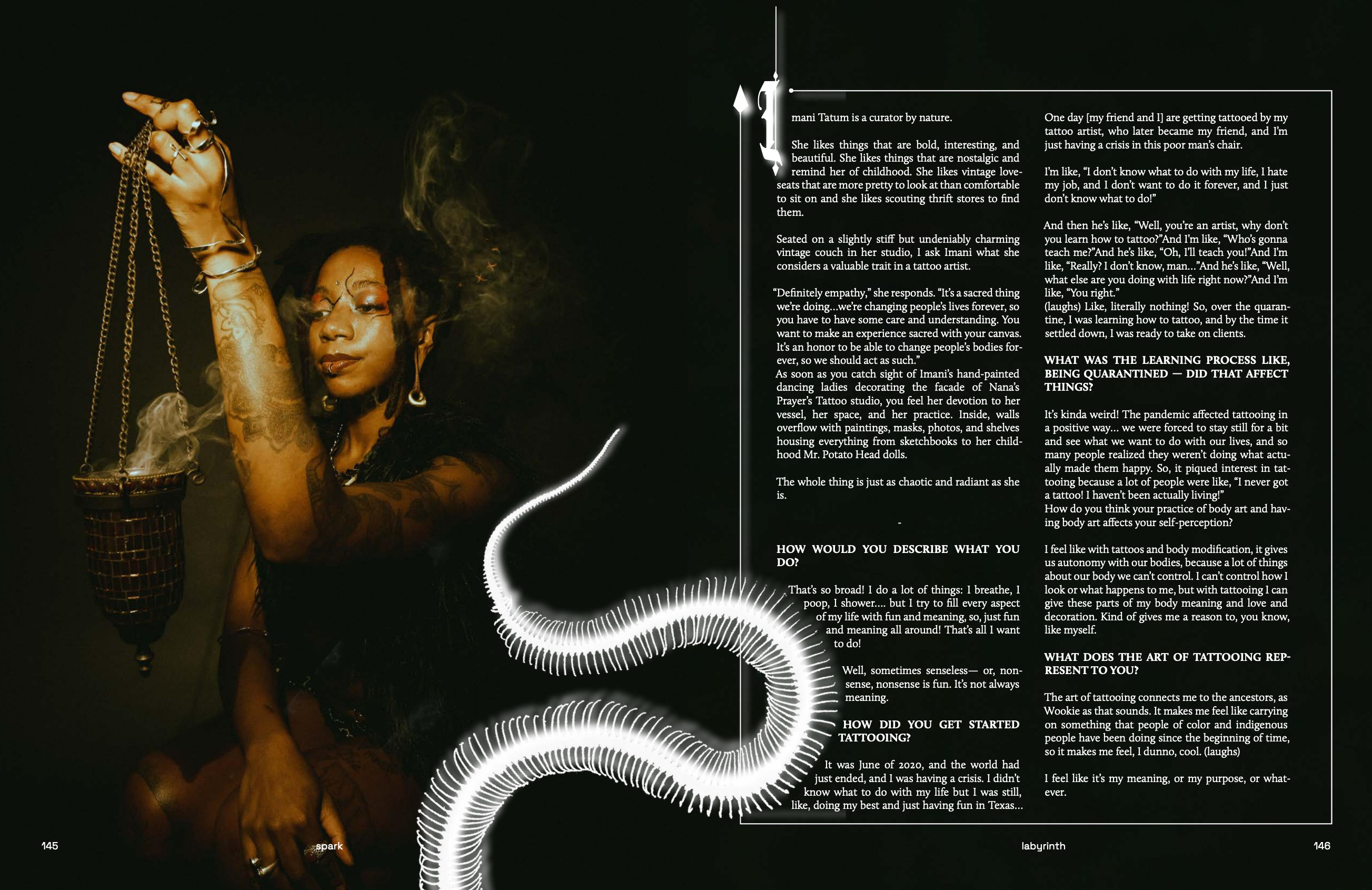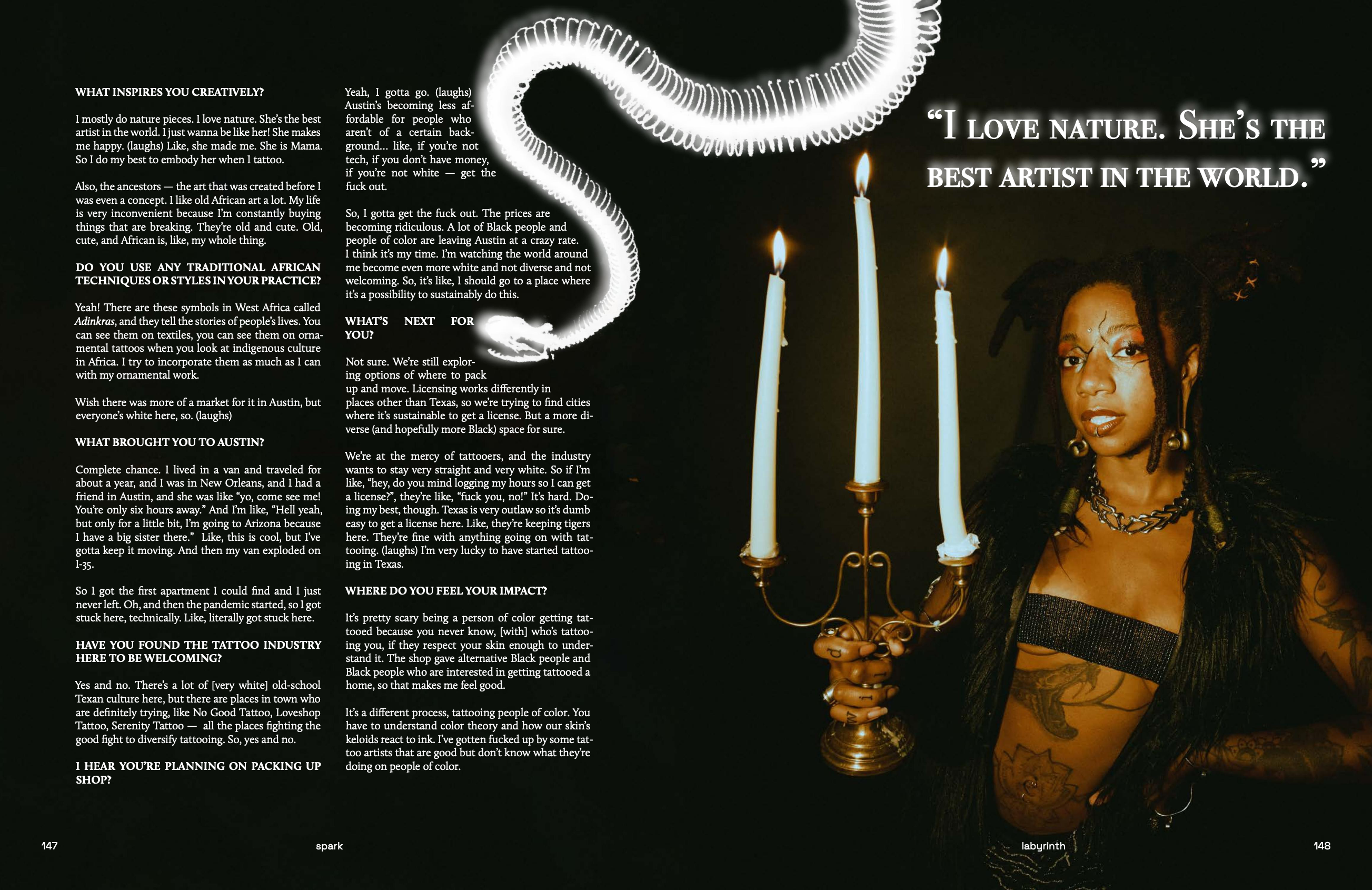Sacred Skin
By Kunika Trehan
May 2, 2023

Imani Tatum: “The art of tattooing connects me to the ancestors.”
Imani Tatum is a curator by nature.
She likes things that are bold, interesting, and beautiful. She likes things that are nostalgic and remind her of childhood. She likes vintage loveseats that are more pretty to look at than comfortable to sit on and she likes scouting thrift stores to find them.
Seated on a slightly stiff but undeniably charming vintage couch in her studio, I ask Imani what she considers a valuable trait in a tattoo artist.
“Definitely empathy,” she responds. “It’s a sacred thing we’re doing…we’re changing people’s lives forever, so you have to have some care and understanding. You want to make an experience sacred with your canvas. It’s an honor to be able to change people’s bodies forever, so we should act as such.”

As soon as you catch sight of Imani’s hand-painted dancing ladies decorating the facade of Nana’s Prayer’s Tattoo studio, you feel her devotion to her vessel, her space, and her practice. Inside, walls overflow with paintings, masks, photos, and shelves housing everything from sketchbooks to her childhood Mr. Potato Head dolls.
The whole thing is just as chaotic and radiant as she is.
-
How would you describe what you do?
That’s so broad! I do a lot of things: I breathe, I poop, I shower…. but I try to fill every aspect of my life with fun and meaning, so, just fun and meaning all around! That’s all I want to do!
Well, sometimes senseless— or, nonsense, nonsense is fun. It’s not always meaning.
How did you get started tattooing?
It was June of 2020, and the world had just ended, and I was having a crisis. I didn’t know what to do with my life but I was still, like, doing my best and just having fun in Texas… One day [my friend and I] are getting tattooed by my tattoo artist, who later became my friend, and I’m just having a crisis in this poor man’s chair.
I’m like, “I don’t know what to do with my life, I hate my job, and I don’t want to do it forever, and I just don’t know what to do!”
And then he’s like, “Well, you’re an artist, why don’t you learn how to tattoo?”And I’m like, “Who’s gonna teach me?”And he’s like, “Oh, I’ll teach you!”And I’m like, “Really? I don’t know, man…”And he’s like, “Well, what else are you doing with life right now?”And I’m like, “You right.”
(laughs) Like, literally nothing! So, over the quarantine, I was learning how to tattoo, and by the time it settled down, I was ready to take on clients.
What was the learning process like, being quarantined — did that affect things?
It’s kinda weird! The pandemic affected tattooing in a positive way… we were forced to stay still for a bit and see what we want to do with our lives, and so many people realized they weren’t doing what actually made them happy. So, it piqued interest in tattooing because a lot of people were like, “I never got a tattoo! I haven’t been actually living!”
How do you think your practice of body art and having body art affects your self-perception?
I feel like with tattoos and body modification, it gives us autonomy with our bodies, because a lot of things about our body we can’t control. I can’t control how I look or what happens to me, but with tattooing I can give these parts of my body meaning and love and decoration. Kind of gives me a reason to, you know, like myself.
What does the art of tattooing represent to you?
The art of tattooing connects me to the ancestors, as Wookie as that sounds. It makes me feel like carrying on something that people of color and indigenous people have been doing since the beginning of time, so it makes me feel, I dunno, cool. (laughs)
I feel like it’s my meaning, or my purpose, or whatever.
What inspires you creatively?
I mostly do nature pieces. I love nature. She’s the best artist in the world. I just wanna be like her! She makes me happy. (laughs) Like, she made me. She is Mama. So I do my best to embody her when I tattoo.
Also, the ancestors — the art that was created before I was even a concept. I like old African art a lot. My life is very inconvenient because I’m constantly buying things that are breaking. They’re old and cute. Old, cute, and African is, like, my whole thing.

Do you use any traditional African techniques or styles in your practice?
Yeah! There are these symbols in West Africa called Adinkras, and they tell the stories of people’s lives. You can see them on textiles, you can see them on ornamental tattoos when you look at indigenous culture in Africa. I try to incorporate them as much as I can with my ornamental work.
Wish there was more of a market for it in Austin, but everyone’s white here, so. (laughs)
What brought you to Austin?
Complete chance. I lived in a van and traveled for about a year, and I was in New Orleans, and I had a friend in Austin, and she was like “yo, come see me! You’re only six hours away.” And I’m like, “Hell yeah, but only for a little bit, I’m going to Arizona because I have a big sister there.” Like, this is cool, but I’ve gotta keep it moving. And then my van exploded on I-35.
So I got the first apartment I could find and I just never left. Oh, and then the pandemic started, so I got stuck here, technically. Like, literally got stuck here.
Have you found the tattoo industry here to be welcoming?
Yes and no. There’s a lot of [very white] old-school Texan culture here, but there are places in town who are definitely trying, like No Good Tattoo, Loveshop Tattoo, Serenity Tattoo — all the places fighting the good fight to diversify tattooing. So, yes and no.
I hear you’re planning on packing up shop?
Yeah, I gotta go. (laughs) Austin’s becoming less affordable for people who aren’t of a certain background… like, if you’re not tech, if you don’t have money, if you’re not white — get the fuck out.
So, I gotta get the fuck out. The prices are becoming ridiculous. A lot of Black people and people of color are leaving Austin at a crazy rate. I think it’s my time. I’m watching the world around me become even more white and not diverse and not welcoming. So, it’s like, I should go to a place where it’s a possibility to sustainably do this.
What’s next for you?
Not sure. We’re still exploring options of where to pack up and move. Licensing works differently in places other than Texas, so we’re trying to find cities where it’s sustainable to get a license. But a more diverse (and hopefully more Black) space for sure.
We’re at the mercy of tattooers, and the industry wants to stay very straight and very white. So if I’m like, “hey, do you mind logging my hours so I can get a license?”, they’re like, “fuck you, no!” It’s hard. Doing my best, though. Texas is very outlaw so it’s dumb easy to get a license here. Like, they’re keeping tigers here. They’re fine with anything going on with tattooing. (laughs) I’m very lucky to have started tattooing in Texas.
Where do you feel your impact?
It’s pretty scary being a person of color getting tattooed because you never know, [with] who’s tattooing you, if they respect your skin enough to understand it. The shop gave alternative Black people and Black people who are interested in getting tattooed a home, so that makes me feel good.
It’s a different process, tattooing people of color. You have to understand color theory and how our skin’s keloids react to ink. I’ve gotten fucked up by some tattoo artists that are good but don’t know what they’re doing on people of color.

Do you have any bucket list items?
I really want to open a program or a school for people of color to get into tattooing. Once I get my licenses and have a bigger facility, I would love to open an apprenticeship program where people won’t be turned away based on their skin color or sexual orientation or gender. Tattooing came from people of color, so all of us need to be doing it, you know? It’s crazy that white men just took over the market.
And they don’t know how to tattoo people that aren’t white…
Make it make sense! Because even the best of the best will see darker skin, pigmented skin, and they’re like, uhhh, I don’t know what to do with that. Like, the majority of the world is melanated. It’s crazy.
What advice would you give yourself when you were starting out?
Don’t give up. If there’s a will, there’s a way, and I have a lot of manic energy that I can do something with. So, don’t quit. And be prepared, because you have to have thick skin. Like, I found myself kind of crying a lot. So I would be like, don't do that! Just keep on.
-
In the time since we spoke, Imani has found a new home for her art and her practice: Philadelphia. “It’s a fight that’s gonna have to happen,” she says, speaking to the ongoing struggle of diversifying the tattoo industry. “But it feels more doable in cities like Baltimore, Kansas City, Philadelphia.”
I have no doubt that Imani will continue to carve out comfortable, safe spaces for Black people and people of color to explore self-expression in the years to come. It’s not an easy fight, and there’s a lot left to do, but she’s armed with good spirits, infectious laughter, and an all-encompassing passion for the work she does.
After all, she “wouldn’t want to be doing anything else in the world.” ■
Layout: Jaycee Jamison
Photographer: Mateo Ontiveros
Stylists: Nikki Shah & Yousuf Khan
Set Stylist: Mateo Ontiveros
HMUA: Reagan Richard
Model: Imani Tatum
Other Stories in Labyrinth
© 2025 SPARK. All Rights Reserved.
